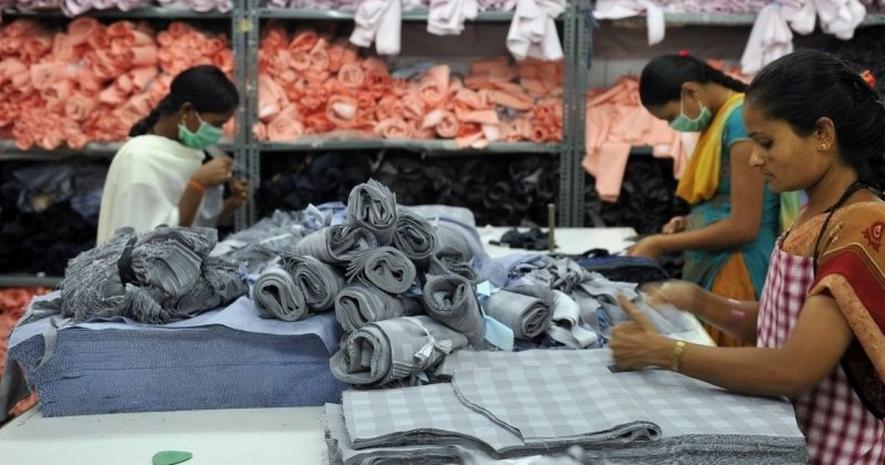Modi Has Done Nothing for Us, Say Karnataka Garment Workers

Image Courtesy: Scroll.in
From 2014 to now, times have changed for sure. Even though the Bharatiya Janata Party is asking people to vote for them in order to make Modi the prime minister again, workers in Karnataka are saying otherwise.
Umesh, the joint secretary of Garment and Textile Workers’ Union (GATWU) says, “When we go to Bengaluru for a meeting or a protest, we cannot afford to buy even a dosa (rice pancake). This is what Modi has done for people like us by slapping the Goods and Services Tax (GST). It is the life of the poor that he and his government have attacked.” Four other garment workers sitting in a park in Maddur agreed with him and started to list the “achievements” of Modi government. One of them pointing out the amendments to the Employees Provident Fund (EPF) withdrawals said, “We, the garment workers were the first to take to streets and protest against it. This showed us what Modi government had in store for workers.” This is just a snippet of the conversation NewsClick had with the garment workers in Maddur. They talked about their working conditions, everyday struggles and their expectations from the state and central governments.
Around 2,000 workers of a unit of Shahi Exports in Maddur had walked out of the factory to protest against the management on June 23, 2018. These workers were demanding their minimum wages and were protesting against the harassment that they face in the hands of the unit in-charges, as reported by NewsClick earlier. Speaking to the same set of workers after ten months, it became clear that nothing has changed, whether it be minimum wage or harassment at the workplace.
Also Read: Workers of Maddur’s Shahi Exports Complain of Harassment, Walk Out of Factory in Protest
Struggle for Increase in Minimum Wage
Divya (name changed) has been working in a garment factory in Maddur. She travels around 25 kms everyday to work from her town by bus and auto. She is the sole bread earner in her family. Her husband left her nine years ago, and she has been taking care of her daughter and son ever since. She lives with her mother, brother and children. Her job is the only option she is left with, and working as a tailor she earns Rs 8,300. After Employees Provident Fund deduction and other such cuts, she gets Rs 7,300, a huge chunk of which goes for her house rent, which is Rs 4,500.
Prakash (name changed) who works as a feeder in a factory in Maddur lives on his own in Maddur in a rented house and pays Rs 2,000 as rent out of his salary of Rs 6,500. He sustains the whole month with the remaining amount. The wages and the expenditure of the garment workers in these cases are self explanatory about their living conditions.
Also Read: Who Would the Garment and Textile Industry Workers in Karnataka Vote for?
The issue of insufficient wages plagues one of the largest informal sectors in the state of Karnataka. According to a government survey two years ago, there were 3.75 lakh workers and 857 factories. Now, there are more than 1,000 factories and 4-4.5 lakh workers working with the industry. Out of these, 80% of the workers in the state are women, and 45% are from women-headed households.
Prakash, Divya, Karuna, Ramesh (names changed) and Umesh have one question for the central government, how does the government expect them to live by not giving money and sucking out their meagre earnings in the name of this tax and that tax? Is it only the rich, who have been given tax concessions, that deserve a decent life? “The Narendra Modi-led central government has got no answer for this question. Modi has completely turned blind towards the problems of farmers and workers,” Umesh explained.
Modi’s interview for DD News on April 15 was a testimonial to this. Modi said, “Why talking about farmers’ suicides is not politicisation, but talking about soldiers’ martyrdom is?" It is clear that the PM neither knows the difference between suicide due to distress and martyrdom of soldiers, nor he respects martyrdom. The BJP and its leadership does not care for anyone’s distress. For them what matters is to gain votes by playing with emotions.”
Also Read: #WorkersStrikeBack: The Longstanding Struggle of Garment and Textile Workers in K’taka
GATWU and other unions in the state have been struggling for increasing the minimum wages for a long time. The current Chief Minister of the state, H D Kumaraswamy had also taken cognisance of their struggles and directed the formation of a committee involving labour department officials, textile manufacturers, central trade unions, and garment workers. The Committee, however, had decided to increase it to Rs 13,000 instead of Rs 18,000 as was demanded by the union and the workers. Following this directive, the managements had filed a petition against this in the High Court. However, in March 2019, the High Court, Umesh said, had ruled in favour of the union and directed the government to revise the minimum wage.
Jayaram from GATWU commenting on the state budget for 2019-20 told NewsClick, “After 40 long years, for the first time, the state government has made an allocation for the garment and textile industry in its budget.” In the budget, the government has earmarked money for housing, skill development and compensation in case of an accident. However as Umesh says, despite it being clear in the budget that the government is with them, they still have to wait and watch what will be done with regard to their minimum wages.
Also Read: A Struggle for Minimum Wage
Governments, since 1979, have turned a blind eye to the garment industry. Karnataka has 76 industries with scheduled employments and none of their managements are united. But, the managements of the garment industry have their unions. This makes them powerful players. They lobby with both the Central and the state governments. As Pratibha, the Secretary of GATWU had observed, this is also reflected in the CM’s attempt to have a dialogue with the employers to decide and increase the minimum wages of the workers.
Pratibha added, “We are fighting for minimum wages. The current figures promised are the result of the fifth revision of the minimum wages in the last 40 years. We faced the same issue in the last four revisions too. The managements interfered in the government’s decision and ensured that the wages were not increased. This is a pattern. A notification will be issued and within a month or so, with no appropriate reason, the notifications are retracted. If they do not pay minimum wages for a month, the profit that these industries make is somewhere around Rs 160 crore. This obviously is in the interest of the managements – to make profits. What does this pattern tell? That is is a management and government lobby.” Apart from this, there have been many reports and studies that have indicated to the existence of violence and harassment in workplaces in the garment industry.
“Why Do You Vote?”
Surprised by this question, Divya said, “We vote because that is the only thing that gives us hope that things might change.” Agreeing with her, Karuna and Umesh said that it’s a right that no worker and farmer can afford to let go of at times like these, when the governments are interested in large corporations and companies. Prakash said, “This time it is very important to vote, otherwise workers like us will be crushed completely.” As Pratibha had observed earlier, the lobby of the managements and the government is strong in the garment sector. Thus, it is crucial for the garment workers to have a government which unlike the current BJP government that is considerate of the workers.
Read More: K’taka Garment and Textile Industry Managements Pressurise the Govt to Curb increase in Wages
Get the latest reports & analysis with people's perspective on Protests, movements & deep analytical videos, discussions of the current affairs in your Telegram app. Subscribe to NewsClick's Telegram channel & get Real-Time updates on stories, as they get published on our website.























